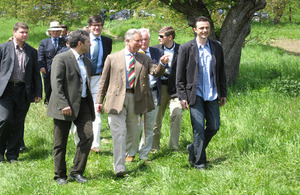' Romania is losing three hectares of virgin forest per hour'
Speech by His Royal Highness Prince Charles at the launch of Wild Carpathia 3 in Bucharest, on 30 October 2013

Prince Charles in Romania
I am sorry that I am unable to be with you here in person in Bucharest this evening, but it gives me great pleasure to join you, in spirit at least, in backing a cause that is close to my heart. May I start by commending Paul Lister and his team at The European Nature Trust for launching this important initiative, by thanking Minister Grapini for her support, and all of you for your presence this evening.
One of the reasons I always enjoy coming to Romania so much is the tremendous natural beauty of its landscapes, not least the unspoilt, wild forests of the Carpathian Mountains. I say ‘unspoilt’, but the sad fact is that these ancient woodlands are rapidly disappearing. In some areas it’s already too late and, with every day that passes, the situation gets worse. Indeed, it is estimated that Romania is losing three hectares of virgin forest per hour, with almost half of this taking place in areas that are supposedly protected.
Why does this matter? Well, largely because Romania is one of the last places in Europe where wild expanses on a meaningful scale still exist. In fact, the Romanian Carpathians contain the largest remaining area of virgin forest in Central and Southern Europe. These forests are a feast of biodiversity, exceptionally rich in fauna and flora. They are home to Europe’s largest surviving populations of brown bear, wolf and lynx, as well as an astonishing one third of all European plant species.
In addition, they act as corridors for the migration of many species, which in turn strengthens the all-important gene pool.
This makes the Romanian Carpathians a priceless natural treasure in a continent that has long since destroyed most of its wildernesses. What you still possess here in Romania has become extremely rare. Many European countries have little or no primary forest left. For example, in the not too distant past we had magnificent ancient forests in Britain, but we cut them down so that today only a few scattered fragments survive, and most of the associated wildlife has become extinct. The denuded Highlands of Scotland offer a stark warning of the fate of the Carpathian Mountains if we don’t act to protect them. Thriving forests will be replaced with the kind of bleak, empty landscape we see in the closing scenes of the latest James Bond film.
Most Europeans, including many Romanians, are unaware of the unique wilderness on their doorstep, and even those that are aware may not realize just how endangered it now is. We urgently need to raise awareness, and the Wild Carpathia series of films, will reach out to the young and old alike to alert them to Romania’s wonderful natural heritage. It’s about respecting the sensitive balance of nature and the inter-connectedness of all life, because, to paraphrase the pioneering conservationist John Muir, “When one tugs at a single living thing in nature, one finds it attached to the rest of the world.” We have a duty to save Europe’s last pristine wilderness areas while we still can.
Nor should we overlook the economic value of wilderness. The Carpathians have been called the ‘Yellowstone of Europe’, and hold enormous potential for sustainable, long-term tourism revenues, but only if they are preserved intact. So, can I close by saying that the great Carpathian forests and landscapes help to define Romania and to lose them would, in my humble opinion, be a tragedy. Even the word Transylvania – ‘beyond the woods’ – would become meaningless, just a sad echo of history. That’s why initiatives such as Wild Carpathia and the associated TENT programmes are so important, and I urge you all to support it in any way you can. Thank you very much / Mulțumesc.